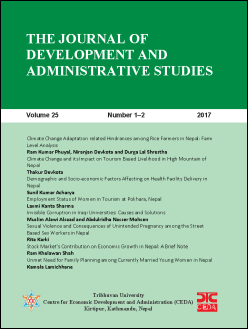Cash Management in Nepalese Manufacturing Enterprises
DOI:
https://doi.org/10.3126/jodas.v22i1-2.13460Keywords:
Cash management, dividend payment, liquidity assets, and investment opportunitiesAbstract
A firm that requires external financing can rely on either debt or equity, but both have an asymmetric information problem which may prevent obtaining financing. In the case of debt financing, the higher the level of informational asymmetry between the firm and the lender, the more difficult it will be for the lender to ascertain the firm's credit quality. In some cases, identifying a firm's quality may be so difficult that the lender may simply ration credit. Because of this asymmetry in lending and the possibility of credit rationing by banks, firms may decide to hold high levels of cash so they can take advantage of positive net present value (NPV) projects even when credit is tight. However, if a firm holds cash, it should not need as much bank financing as it otherwise would. Thus the bank may incur a cost by encouraging cash holdings, namely the loss of potential loans to those firms. Hence, Cash management is the process whereby the cash inflows and outflows are controlled so that current obligations will be met in time and any excess cash will earn income. Specifically, it aims at determining the level of cash holdings by Nepalese manufacturing enterprises. With this in mind, samples of Nepalese manufacturing firms have been used to conduct a study with secondary data. First, regression model is used to test for the existence of an optimal cash holding in this study. The study based on twelve manufacturing enterprises covering the period 1999-2012. The study is reveals that cash holdings are positively affected by the investment opportunity set and cash flows while negatively affected by asset’s liquidity, interest rate, leverage and size in Nepalese manufacturing enterprises.
The Journal of Development and Administrative Studies, Vol. 22, No. 1-2, pp. 1-14, 2014
Downloads
Downloads
Published
How to Cite
Issue
Section
License
The copyright of the accepted articles is reserved by the Centre for Economic Development and Administration (CEDA), Tribhuvan University (TU). No part of the article published in this journal should be reproduced except provided by the law currently in force without the written consent of the centre.




